Related Research Articles

The Hitchhiker's Guide to the Galaxy is a comedy science fiction franchise created by Douglas Adams. Originally a 1978 radio comedy broadcast on BBC Radio 4, it was later adapted to other formats, including novels, stage shows, comic books, a 1981 TV series, a 1984 text adventure game, and 2005 feature film.
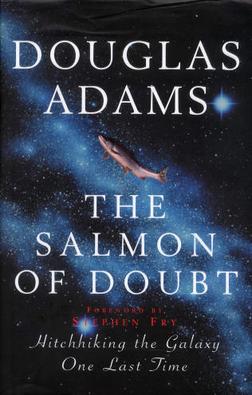
The Salmon of Doubt: Hitchhiking the Galaxy One Last Time is a posthumous collection of previously published and unpublished material by Douglas Adams. It consists largely of essays, interviews, and newspaper/magazine columns about technology and life experiences, but its major selling point is the inclusion of the incomplete novel on which Adams was working at the time of his death, The Salmon of Doubt. English editions of the book were published in the United States and UK on 11 May 2002, exactly one year after the author's death.

Mostly Harmless is a 1992 novel by Douglas Adams and the fifth book in the Hitchhiker's Guide to the Galaxy series. It is described on the cover of the first edition as "The fifth book in the increasingly inaccurately named Hitchhikers Trilogy". It was the last Hitchhiker's book written by Adams and his final book released in his lifetime.

Ford Prefect is a fictional character in The Hitchhiker's Guide to the Galaxy by the British author Douglas Adams. His role as Arthur Dent's friend – and rescuer, when the Earth is unexpectedly demolished to make way for a hyperspace bypass at the start of the story – is often expository, as Ford is an experienced galactic hitchhiker and explains that he is actually an alien journalist, a field researcher for the titular Guide itself, and not an out-of-work actor from Guildford as he had claimed.
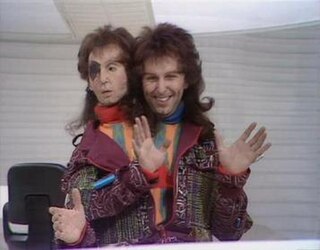
Zaphod Beeblebrox is a fictional character in the various versions of the comic science fiction series The Hitchhiker's Guide to the Galaxy by Douglas Adams.

Marvin the Paranoid Android is a fictional character in The Hitchhiker's Guide to the Galaxy series by Douglas Adams. Marvin is the ship's robot aboard the starship Heart of Gold. Originally built as one of many failed prototypes of Sirius Cybernetics Corporation's GPP technology, Marvin is afflicted with severe depression and boredom, in part because he has a "brain the size of a planet" which he is seldom, if ever, given the chance to use. Instead, the crew request him merely to carry out mundane jobs such as "opening the door". Indeed, the true horror of Marvin's existence is that no task he could be given would occupy even the tiniest fraction of his vast intellect. Marvin claims he is 50,000 times more intelligent than a human, though this is, if anything, an underestimation. When kidnapped by the bellicose Krikkit robots and tied to the interfaces of their intelligent war computer, Marvin simultaneously manages to plan the entire planet's military strategy, solve "all of the major mathematical, physical, chemical, biological, sociological, philosophical, etymological, meteorological and psychological problems of the Universe, except his own, three times over", and compose several lullabies.

Arthur Philip Dent is a fictional character and the hapless protagonist of the comic science fiction series The Hitchhiker's Guide to the Galaxy by Douglas Adams.

Life, the Universe and Everything is the third book in the six-volume Hitchhiker's Guide to the Galaxy science fiction "trilogy of six books" by British writer Douglas Adams. The title refers to the Answer to Life, the Universe, and Everything.

The Vogons are a fictional alien race from the planet Vogsphere in The Hitchhiker's Guide to the Galaxy—initially a BBC Radio series by Douglas Adams—who are responsible for the destruction of the Earth, in order to facilitate an intergalactic highway construction project for a hyperspace express route. Vogons are slug-like but vaguely humanoid, are bulkier than humans, and have green skin. Vogons are described as "one of the most unpleasant races in the galaxy—not actually evil, but bad-tempered, bureaucratic, officious and callous", and having "as much sex appeal as a road accident" as well as being the authors of "the third worst poetry in the universe". They are employed as the galactic government's bureaucrats. According to Marvin the Paranoid Android, they are also the worst marksmen in the galaxy. They follow orders as they are told, and do not allow exceptions.
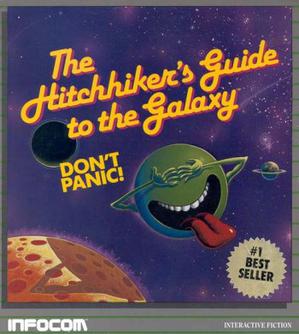
The Hitchhiker's Guide to the Galaxy is an interactive fiction video game based on the comedic science fiction series of the same name. It was designed by series creator Douglas Adams and Infocom's Steve Meretzky, and it was first released in 1984 for the Apple II, Mac, Commodore 64, CP/M, MS-DOS, Amiga, Atari 8-bit computers, and Atari ST. It is Infocom's fourteenth game.
Mark Wing-Davey is a British actor and director. He portrayed Zaphod Beeblebrox in the radio and television versions of The Hitchhiker's Guide to the Galaxy.

The Hitchhiker's Guide to the Galaxy is the first book in the Hitchhiker's Guide to the Galaxy comedy science fiction "trilogy of five books" by Douglas Adams, with a sixth book written by Eoin Colfer. The novel is an adaptation of the first four parts of Adams's radio series of the same name, centering on the adventures of the only man to survive the destruction of Earth; while roaming outer space, he comes to learn the truth behind Earth's existence. The novel was first published in London on 12 October 1979. It sold 250,000 copies in the first three months.
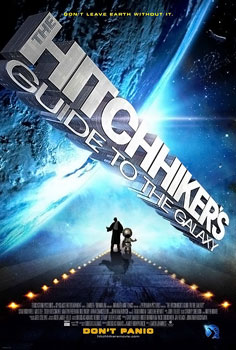
The Hitchhiker's Guide to the Galaxy is a 2005 science fiction comedy film directed by Garth Jennings, based upon the Hitchhiker's Guide to the Galaxy series created by Douglas Adams. It stars Martin Freeman, Sam Rockwell, Mos Def, Zooey Deschanel, Bill Nighy, Anna Chancellor, and John Malkovich, and the voices of Stephen Fry, Helen Mirren, Richard Griffiths, Thomas Lennon, Ian McNeice, and Alan Rickman. Adams co-wrote the screenplay with Karey Kirkpatrick but Adams died in 2001, before production began, therefore the film is dedicated to him. The film received mainly positive reviews and grossed over $100 million worldwide.

The Hitchhiker's Guide to the Galaxy is a BBC television adaptation of Douglas Adams' The Hitchhiker's Guide to the Galaxy which aired between 5 January and 9 February 1981 on BBC2 in the United Kingdom. The adaptation follows the original radio series in 1978 and 1980, the first novel and double LP, in 1979, and the stage shows, in 1979 and 1980, making it the fifth iteration of the guide.
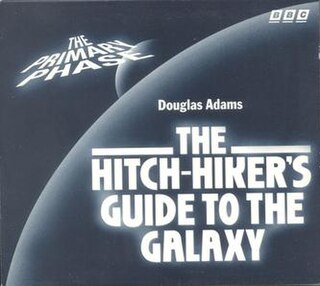
The terms Primary Phase and Secondary Phase describe the first two radio series of The Hitchhiker's Guide to the Galaxy, first broadcast in 1978. These were the first incarnations of the Hitchhiker's Guide to the Galaxy franchise. Both were written by Douglas Adams and consist of six episodes each.
The Tertiary Phase, Quandary Phase, Quintessential Phase and Hexagonal Phase are respectively the third, fourth, fifth and sixth series of The Hitchhiker's Guide to the Galaxy radio series. Produced in 2003, 2004 and 2018 by Above the Title Productions for BBC Radio 4, they are radio adaptations of the third, fourth, fifth and sixth books in Douglas Adams' The Hitchhiker's Guide to the Galaxy series: Life, the Universe and Everything; So Long, and Thanks For All the Fish; Mostly Harmless and And Another Thing....

Ann VanderMeer is an American publisher and editor, and the second female editor of the horror magazine Weird Tales. She is the founder of Buzzcity Press.

And Another Thing... is the sixth and final installment of Douglas Adams' The Hitchhiker's Guide to the Galaxy "trilogy of six books". The book, written by Eoin Colfer was published on the thirtieth anniversary of the first book, 12 October 2009, in hardback. It was published by Penguin Books in the UK and by Hyperion Books in the US. Colfer was given permission to write the book by Adams' widow Jane Belson.

The Time Traveler's Almanac is a 2013 anthology edited by Ann and Jeff VanderMeer. It contains stories that focus on time travel. It was released in November 2013 in the UK and on March 18, 2014, in the US.
References
- ↑ Zaleski, Jeff (15 April 2002). "The salmon of doubt: Hitchhiking the galaxy one last time". Publishers Weekly .
- ↑ "BOOK REVIEWS". Star Press. 22 September 2005.
- ↑ Kincaid, Paul (4 August 2014). "The Time Traveler's Almanac, edited by Ann VanderMeer and Jeff VanderMeer". Strange Horizons . Retrieved 24 November 2024.